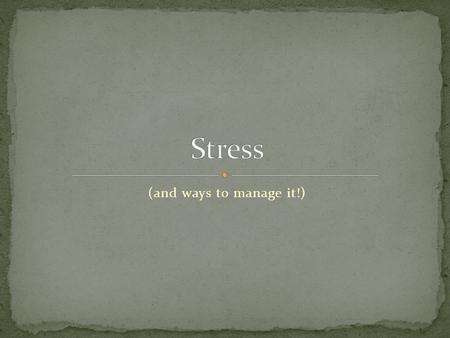Presentation on theme: “Managing Stress and Anxiety”— Presentation transcript:
1 Managing Stress and Anxiety 
2 What is Stress? Reaction of the body and mind to everyday challenges and demands Stress can affect your physical, mental, and social health How much stress you feel depends upon your perception of the event 
3 What causes stress? Stressors is anything that causes stress
Biological: illnesses, injuries Environmental: poverty, pollution, noise Cognitive: how you perceive a situation Personal Behavior: tobacco, alcohol, drugs Life Situation: death, divorce, friends 
4 Bodies Stress Response
Alarm: First stage, body and mind go into high alert. Flight or Fight. Prepares Body Resistance: Second Stage, body adapts and reacts. Fatigue: Third stage, body loses ability to adapt and fatigue sets in. Tired feeling takes over. 
5 Stress and Your Health Unavoidable part of life
Physical effects: Psychosomatic Response Psycho: of the mind Somatic: of the body Headache Asthma High blood pressure Weakened immune system 
6 Stress and Your Body (cont)
Mental/Emotional and Social Effects Difficulty concentrating Mood swings Risk of substance abuse 
7 Managing Stress Identify Personal Causes
Life events: graduation, moving, illness, divorce Physical: injury, lack of sleep, drug use, excessive dieting or exercise Daily Hassles: deadlines, conflicts, time 
8 Ways to Manage Stress Plan Ahead Get enough Sleep Physical Activity
Eat Nutritious Food Avoid Tobacco, Alcohol and Drugs 
9 Stress Management Techniques
Redirect Energy Relaxation Positive Outlook Seek help 
10 Anxiety Condition of feeling uneasy or worried about what may happen.
Feelings of fear Perspiration, muscle tension, trembling Rapid heart rate, shortness of breath 
11 Depression Prolonged feelings of helplessness, hopelessness, and sadness. Reactive: response to a stressful event. Usually goes away on its own Major: medical condition requiring treatment. 
12 Symptoms of Teen Depression
Most young people do not act sad or seem different from their friends. Irritable or restless moods Withdrawal from friends Change in appetite or weight Feelings of guilt or worthlessness Sense of hopelessness 
13 Suicide The act of intentionally taking one’s own life.
Most thoughts of committing suicide are impulsive and temporary, the unfortunate consequence – death or debilitating injury- is permanent. 
14 Risk Factors 90% of those who kill themselves are suffering from depression or mental disorders. History of physical or sexual abuse Alcohol or drug abuse History of previous suicide attempts Family history of emotional disorders or suicide 
15 Warning Signs Verbal: Direct statements: I want to die, I don’t want to live anymore, I wish I where dead Indirect statements: They will be sorry when I’m gone, Nothing matters, I won’t have to put up with this much longer. Writing poems, songs or lyrics about death Suicide threats 
16 Warning Signs Non-verbal or behavioral Withdrawal from friends
Impulsive or bizarre behavior Preoccupation with giving personal belongings away Violent actions Substance abuse Dramatic changes in personality, hygiene or apperarance 
17 Helping Others Initiate a meaningful conversation
Show interest Listen Be patient and understanding Show support and ask questions Remind them that most problems have solutions Ask them if they are planning to kill themselves Try to persuade the person to seek help Get them to talk with a parent, teacher, counselor, Offer to go with them to get help 
There never seems to be enough hours in a day. And in those few hours, you’re loaded with deadlines, responsibilities, errands and expectations. With stress weighing you down, daily tasks get harder and harder to handle — like a heavy backpack getting heavier as the day goes on.
Fortunately, there are 4 steps to help reduce stress and cope with the inevitable stressors of everyday life:
1. Avoid.
Believe it or not, it is possible to escape some of the minor stressors that tend to trouble people:
- Take control of the stress that fills your day by finding ways to ways to make the situation better. For example, if your commute is stressful, try buying a new CD to make it more enjoyable.
- Create distance between you and something that causes stress. If a co-worker continually irritates you, create physical distance between the two of you.
- Say no when necessary.
2. Alter.
Communicate clearly and let people know your expectations. It can make a world of difference:
- Respectfully ask someone to alter how they are treating you. Remember to use “I” statements when addressing someone about how you feel.
- State your limitations in advance. For example, you can say, “I only have five minutes to talk.”
3. Accept.
Accepting the situation can ease much of the stress when avoiding and altering doesn’t work:
- Talk with someone about how you are feeling. Call a friend, get coffee with a relative or schedule an appointment with a therapist.
- Forgive yourself or others. It is an important element of accepting stressful situations, and moving on is easier than sitting around stressing about uncontrollable situations.
4. Adapt.
Changing your standards and expectations of stressful situations can help you cope with stress:
- Don’t strive for perfection. Instead make reasonable substitutes throughout your daily life.
- Choose dinners that are easier to prepare and still make your family happy.
- Don’t replaying stressful situations over and over in your head.
- Choose to focus on the positive aspects in your life.
- Change your perspective by asking yourself if the stressor will matter in five years.
Stress is a part of everyday life. Practicing these four steps can help to provide balance for a healthier, happier lifestyle.
Learn more about stress:
Alan Conway, M.D., is a Family Medicine physician in Eau Claire, Wisconsin.




